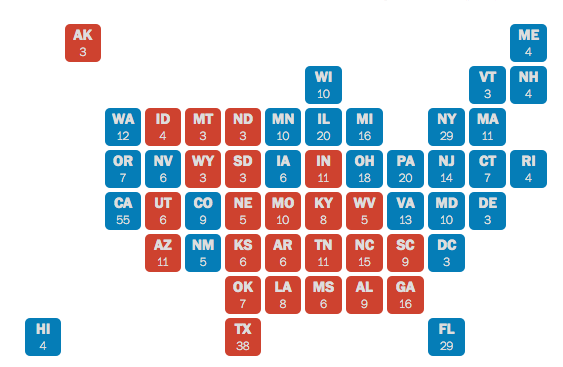The Flurry About Faithless Electors Comes to a Close

December 20, 2016
On November 8th, 2016, the entire world witnessed the election of Donald J. Trump to the White House, the most powerful position on the planet. But his election was controversial because he only won the office thanks to the unique system of elections that the American Constitution established: the electoral college. Even though Hillary Clinton won the most votes, because Trump’s votes were more strategically situated, he won the popular vote in more states than Clinton, granting him a victory in the electoral college.
Between the actual date of the election and December 19th, the date on which electors themselves gather in their own state capitals to cast their ballots and officially decide the President, many elements appealed to the electors to intervene against a Trump presidency. By law, electors are free to vote against the winner of their states; such individuals are extremely rare and are termed “faithless electors”. There have only been a select many throughout the course of American history, and they have never actually impacted the outcome of the election.
But because Trump did not win the popular vote, and because of the apocalyptic outcomes certain partisans attach to his presidency, many have lobbied in many different ways for the electors to overturn the election of Donald Trump. Referencing, in particular, Federalist Paper No. 68, critics argue to electors that Trump is precisely the demagogic dictator that the electoral college was meant to prevent from ever taking office by placing a safeguard on the will of people and their ability to put tyrants into power. Contrarily, others claim that both candidates and the people accepted the system of elections as it was instituted, and that Trump won with full legitimacy and that even if he was kept from office, millions upon millions would feel justly angry that “their man” had been brought down by the other political party.
In any case, news media was abuzz with the efforts and opinions of those who sought to convince electors to abandon the winner of their state. Select sources affirmed that this was a possible and even feasible feat; most regarded it with heavy skepticism. In some instances, electors themselves came out and detailed cases of harassment and even death threats from salty Democrats trying their hardest to deny Trump his office.
But the outcome yesterday was bordering on the hilarious. True, two electors did defect from Donald Trump, which is more than the amount of faithless electors from the years of 2004, 2008, and 2012 combined (1, 0, and 0 respectably). These two electors, both Texans, voted for Ron Paul and John Kasich, leaving Trump with 304 out of the 306 electoral votes he was pledged.
Of course, the real headline is what happened to Hillary Clinton. Clinton made history for being the first female nominee of a major party; she continues to be a bold trendsetter and maker of history by losing a total of 5(!) faithless electors. In a truly historic turn of events, she has had the most faithless electors pledged to her defect since Horace Greeley, who ran for office in 1872 and lost 63 of 66 electors pledged to him because he died between election day and the day the electors vote. Good going, Hillary!















